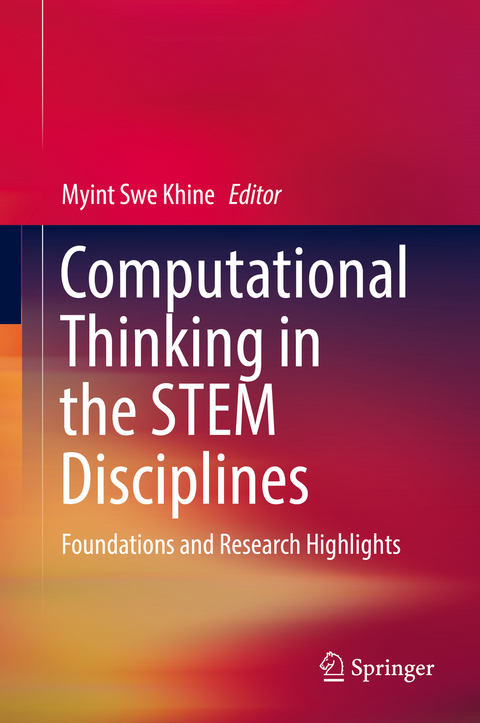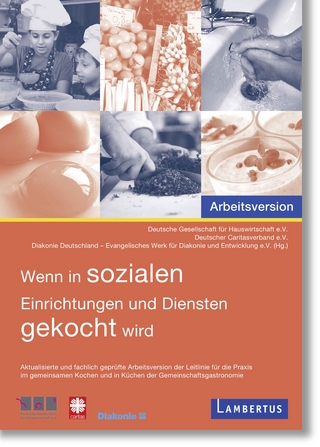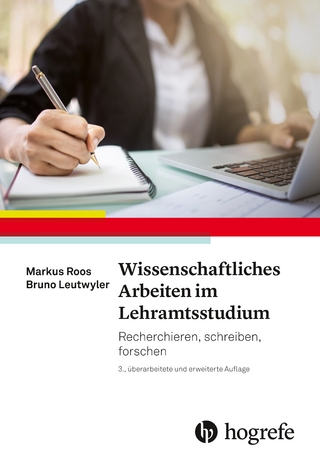
Computational Thinking in the STEM Disciplines
Springer International Publishing (Verlag)
978-3-319-93565-2 (ISBN)
This book covers studies of computational thinking related to linking, infusing, and embedding computational thinking elements to school curricula, teacher education and STEM related subjects. Presenting the distinguished and exemplary works by educators and researchers in the field highlighting the contemporary trends and issues, creative and unique approaches, innovative methods, frameworks, pedagogies and theoretical and practical aspects in computational thinking.
A decade ago the notion of computational thinking was introduced by Jeannette Wing and envisioned that computational thinking will be a fundamental skill that complements to reading, writing and arithmetic for everyone and represents a universally applicable attitude. The computational thinking is considered a thought processes involved in a way of solving problems, designing systems, and understanding human behaviour. Assimilating computational thinking at young age will assist them to enhance problem solving skills, improve logical reasoning, and advance analytical ability - key attributes to succeed in the 21st century.Educators around the world are investing their relentless effort in equipping the young generation with real-world skills ready for the demand and challenges of the future. It is commonly believed that computational thinking will play a pivotal and dominant role in this endeavour. Wide-ranging research on and application of computational thinking in education have been emerged in the last ten years. This book will document attempts to conduct systematic, prodigious and multidisciplinary research in computational thinking and present their findings and accomplishments.
Dr. Myint Swe Khine is a Professor and Chair of Assessment and Evaluation Centre, Emirates College for Advanced Education, United Arab Emirates and Adjunct Professor at the STEM Education Research Group,, Curtin University, Perth, Australia. He obtained Master degrees from the University of Southern California, Los Angeles, USA and University of Surrey, Guildford, UK, and Doctor of Science Education from Curtin University, Australia. Before joining ECAE, he worked at the National Institute of Education, Nanyang Technological University in Singapore. He has published widely and edited books on science, technology and STEM education. Recent book Science -spatial Ability in STEM Education: Transforming Research into Practice is published by Springer in 2017.
FOREWORD, Punya Mishra and Danah Henriksen.- PART I: FOUNDATIONS IN COMPUTATIONAL THINKING.- Strategies for Developing Computational Thinking, Myint Swe Khine.- Characteristics of Studies Conducted on Computational Thinking: A Content Analysis, Filiz Kalelioglu.- Microworlds, Objects First, Computational Thinking and Programming, Greg Michaelson.- Toward a Phenomenology of Computational Thinking in STEM Education, Pratim Sengupta, Amanda Dickes, Amy Farris.- Strictly Objects First: A Multi-Purpose Course on Computational Thinking, Johannes Krugel, Peter Hubwieser.- Introducing Computational Thinking through Spreadsheets, John Sanford.- PART II: COMPUTATIONAL THINKING AND TEACHER EDUCATION.- Preparing Pre-Service Teachers to Promote Computational Thinking in School Classrooms, Charoula Angeli, Kamini Jaipal-Jamani.- Computational Thinking in K-12: In-service Teacher Perceptions of Computational Thinking, Phil Sands, Aman Yadav and Jon Good.- Computational Thinking Curriculum and Teacher Professional Development in South Korea, Soohwan Kim, Hae Young Kim .- PART III: COMPUTATIONAL THINKING IN SCHOOLS AND HIGHER EDUCATION.- Exploring the Scope and the Conceptualization of Computational Thinking at the K-12 Classroom Level Curriculum, Georgios Fessaki, Vasilis Komis, Elisavet Mavroudi and Stavroula Prantsoudi.- Introducing Coding and Computational Thinking in the Schools: TACCLE 3 Coding Project Experience, Francisco J. García-Peñalvo, Daniela Reimann, Christiane Maday.- Case Studies of Elementary Children's Engagement in Computational Thinking through Scratch Programming, Sze Yee Lye.- Higher Education Development Centre, Joyce Hwee Ling Koh.- Integrating Computational Thinking in School Curriculum, Mehmet Aydeniz.- Susceptibility to Learn Computational Thinking against STEM Attitudes and Aptitudes, Ana Calderon.- Mapping Computational Thinking for a Transformative Pedagogy, Michael Vallance, Phillip A. Towndrow.
| Erscheinungsdatum | 23.08.2018 |
|---|---|
| Zusatzinfo | XVII, 325 p. 122 illus. |
| Verlagsort | Cham |
| Sprache | englisch |
| Maße | 155 x 235 mm |
| Gewicht | 678 g |
| Themenwelt | Sozialwissenschaften ► Pädagogik ► Allgemeines / Lexika |
| Schlagworte | coding and computational thinking • computational thinking education • computational thinking STEM • Computer Science Education • critical thinking • learning in school • problem solving skills • School Curriculum • scratch programming • STEM classroom • Teacher Education • teaching early childhood • Transformative pedagogy • visual block programming |
| ISBN-10 | 3-319-93565-8 / 3319935658 |
| ISBN-13 | 978-3-319-93565-2 / 9783319935652 |
| Zustand | Neuware |
| Haben Sie eine Frage zum Produkt? |
aus dem Bereich


